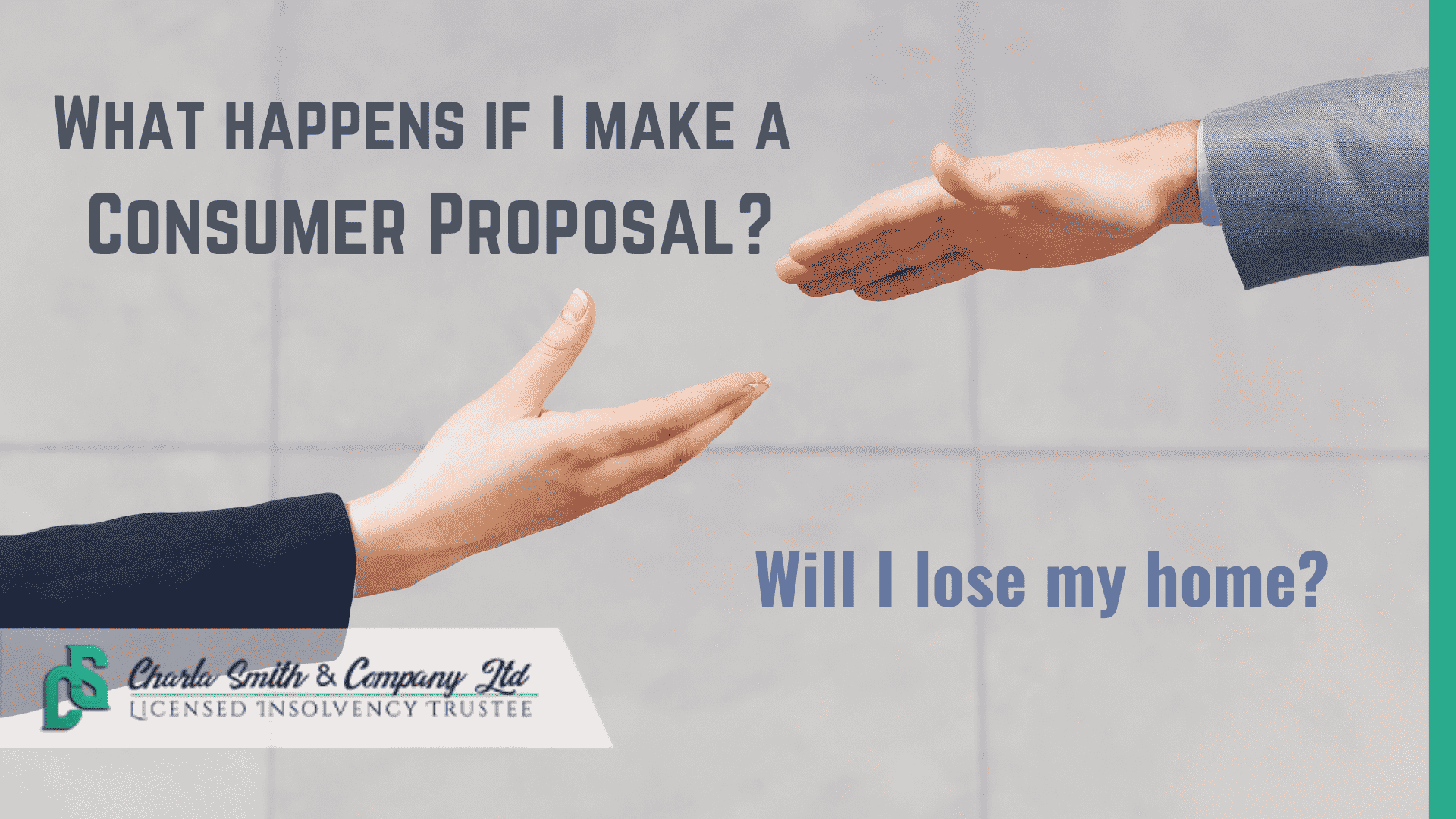
A Consumer Proposal is an agreement you make with your creditors to allow you more time to pay your debt, and often also allows you to pay only a fraction of that debt while the rest is forgiven. For some, this sounds too good to be true.
It’s not.
But there are some things you’ll need to know before you decide to go this route. A Licensed Insolvency Trustee (the only party who can administer a Consumer Proposal) will meet with you before you file a proposal and make sure you’re aware of how it will impact you, which can be highly dependent on your situation. That said, in this blog series we aim to help you with some information to determine if it’s worth exploring a Consumer Proposal to deal with your debt.
What will happen to my home?
One of the biggest concerns people have is whether making a Consumer Proposal will impact their ability to stay in their home. In this blog post, we will explore what happens to your home if you file a Consumer Proposal.
Rent vs. Own
First, the Licensed Insolvency Trustee will ask whether you rent your home or own it.
RENT
If you rent, it’s highly unlikely there would be any impact to your home if you’ve been keeping your rent payments up to date. The home is not considered an asset of yours, so your creditors will not expect you to address your home at all in your proposal. Your landlord likely won’t know that you've filed a Consumer Proposal, but even if they find out, it’s unlikely to impact an existing lease agreement that is in good standing. In fact, the Bankruptcy and Insolvency Act specifically states that any term in a lease agreement that says that making an insolvency filing is a default of the agreement, is unenforceable. If your lease is in good standing, as long as you keep making your rent payments, it’s unlikely your landlord would even see your proposal filing as an issue.
If you’re behind on rent, you'd be required to list your landlord as a creditor and they would participate in the proposal and have a chance to vote on the terms, which may include paying less than what you owe. If the proposal is approved by the majority of creditors, even if your landlord votes no, they’re bound by the terms of the proposal as long as you continue to be in compliance with its terms. So not only would they have to accept the payment you’ve proposed on the outstanding rent, they would not be allowed to terminate your lease due to non-payment (as long as you make your rent payments on time after the proposal is filed). That said, in some cases people find the history of non-payment means the relationship with their landlord has deteriorated beyond repair such that they feel they have to move.
If you’re looking to rent a new home after filing a Consumer Proposal, you may find that your proposal filing (which will show up when they run a credit check) is a deterrent for some landlords. Therefore, you may have fewer options and/or less negotiating power when it comes to the amount of rent you will have to pay.
OWN
If you own your home, filing a Consumer Proposal won't cause you to lose your home.
However, if you’re behind on mortgage payments, a Consumer Proposal typically won’t help you deal with this issue. That’s because Consumer Proposals generally only deal with unsecured debt, and a mortgage is a secured debt. So unless you’re able to reach an agreement with your mortgage company, they’ll be able to commence or continue actions to deal with the mortgage default, including foreclosure actions, even if you file a Consumer Proposal.
If your mortgage is in good standing, your mortgage company will be notified of your Consumer Proposal but will not be subject to its terms, so they likely won’t pay much attention to it. As long as you keep making your payments, there’s usually no impact. When your mortgage comes up for renewal, a Consumer Proposal may limit your options for going with a new lender, as the new lender will run a credit check and may be concerned by your Consumer Proposal filing, whereas your existing lender likely won’t require an updated credit application and instead will rely on your payment history with them.
On the flip side, if you have equity in your home (meaning it is worth more than the mortgage owing), your home might impact your Consumer Proposal. That’s because the equity in your home is an asset, a portion of which might have been available to your creditors if they filed a writ against your house or if you had filed a bankruptcy. Prior to filing a Consumer Proposal, an LIT will work with you to estimate a dollar amount representing the amount of equity that would be available to your creditors. This dollar amount will need to be paid to your creditors as part of your proposal.
Let’s use an example:
If you would get $400,000 in sale proceeds (after-sale costs) in the event of a sale, and your mortgage payout balance is $350,000, you have $50,000 of equity in your home.
- $400,000 sale value
- $350,000 mortgage payout
- $50,000 equity
If you live in Alberta and you are the sole owner of the home, you’d get to keep $40,000 of that equity. So the amount of equity available to your creditors would be $10,000.
- $50,000 equity
- $40,000 exemption pursuant to the Civil Enforcement Act
- $10,000 non-exempt (or available) equity
That $10,000 would have to be included in the amount you are offering to pay your creditors because creditors expect any proposal to be at least as good as what they would get in bankruptcy or if they took you to court.
A Consumer Proposal can be paid overtime, but no longer than a period of 5 years. Sometimes, if an individual has a lot of equity in their home, they can’t afford to make high enough payments over the course of a 5-year proposal to pay their creditors the available equity. In that case, sometimes it’s necessary for the individual to either sell their home or obtain an additional mortgage on their property to generate the cash needed for the proposal.
The Takeaway
In summary, a Consumer Proposal typically does not impact your ability to stay in your home as long as your rent or mortgage is up to date and you can continue to pay it. If you’re behind on rent, a Consumer Proposal can help you deal with the amount owing to your landlord (although it can’t cure a bad landlord/tenant relationship), but a Consumer Proposal cannot help with a mortgage that is in default. And, depending on your situation, having equity in your home can make a Consumer Proposal more expensive.
As you can see, the impact a Consumer Proposal has on your home (and vice versa) depends on your situation, so if you’re not sure how a proposal would impact you, you may want to consider contacting a Licensed Insolvency Trustee for a consultation. When you do so, the Licensed Insolvency Trustee can also talk to you about other options that may work better for you.
Frequently Asked Questions
Q. Where can I find more information about a Consumer Proposal?
Check out our Consumer Proposal page, or contact us for a free consultation.
Q. How can I find out whether a Consumer Proposal is the right option for settling my debt?
Check out our blog post that explains about options for settling your debt, or contact us for a free consultation.
Q. Will the impact on my home be the same if I file bankruptcy?
Similarly, in a bankruptcy you typically don't lose your home. But if you own your home and you have available equity which you can't afford to pay into the bankruptcy estate, sometimes it is necessary to sell the home. For more information about what happens to your assets in bankruptcy, check out this blog post or contact us for a free consultation.
CHARLA SMITH & COMPANY LTD.

Let us help you get relief from the burden caused by your debt. As a Licensed Insolvency Trustee, Charla Smith & Company are highly trained and experienced in debt relief solutions, and we take great pride in identifying the option that's the best fit for your unique situation. From advice on talking to your creditors to consumer proposals to bankruptcy and everything in between, we’re here to answer questions, guide and advise you so you can take back control of your financial situation. Serving Calgary, AB and surrounding areas.
YOUR TRUSTED CHOICE FOR DEBT RELIEF
With our experience and our caring approach, we will help you find the best option for debt relief based on your unique situation - from advice on talking to your creditors to a consumer proposal or bankruptcy, and everything in between. We are here to lift the burden caused by overwhelming debt.
Contact us today at 1-403-899-3890 for a FREE, confidential, no-commitment meeting, and let us guide you to regaining your financial footing.
